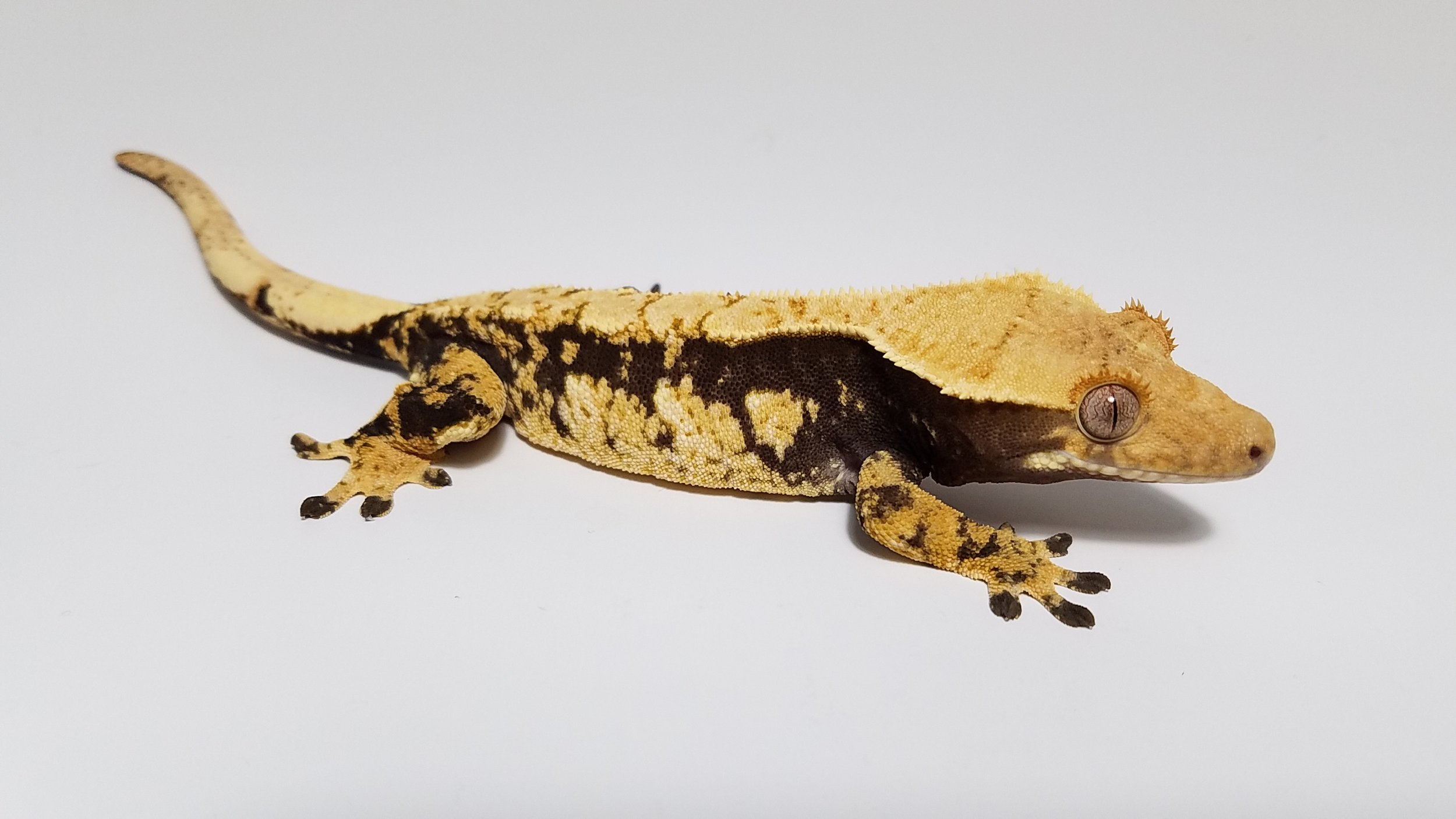Crested Gecko Care Guide
Quick Facts
Originally Inhabited: New Caledonia
Availability: Common, $15-$1000+
Lifespan: 12-20+ years
Weight: 40-60 grams
Tank size: 10+ gallons
Temperature: 70F-82F
Housing
Tanks
Crested geckos are semi-arboreal lizards that spend most of their lives low to the ground. You can often find them sleeping on the ground in their tanks during the day. However that being said crested geckos enjoy branches and plants that they can climb on. Size is more important than age when it comes to picking the appropriate tank for your gecko. We like to keep geckos under 10g in 6qt tubs. Once they’re about 10-20g we move them into 32qt tubs. From here they can be moved into bigger tubs, 40-64qt is plenty big for one or two adult geckos.
Temperature & Humidity
Crested geckos can survive in temperatures between 68F and 82F, however for optimum growth we recommend keeping them between 74F and 78F. Keeping your gecko warmer will greatly increase the rate at which they grow. Humidity should be kept between 50%-80%. This can be achieved by misting once or twice a day. It is important that the tank dries out during the day and isn’t kept too wet. Keeping the tank too wet can cause many problems like respiratory infections in your gecko and mold and fungus in your tank. If your tank is too dry you’ll find your gecko is more likely to be dehydrated and will have more problems shedding. A good medium between moist and dry makes for a happy gecko.
Décor & Substrates
We like to use paper toweling for substrate due to the ease of cleaning and the amount of geckos we have to clean. However if you only have a couple geckos there are other substrates you can use with your geckos if you don’t like the look of paper towel. As far as décor goes a lot of things work as long as they’re not sharp. We use dowels and PVC pipe along with lots of egg crates, pool noodles, sticks and things of that nature. We also use fake plants from amazon to provide cover. You can find lots of fake vines and plants online much cheaper than going to a pet store.
Cohabbing
Cohabbing as it’s often called is keeping more than one gecko in the same tank. You’ve likely heard lots of misinformation about this from people on forums and on Facebook saying you should never do this and that your geckos will die but this simply isn’t true. Cohabbing can be done easily without any issues but should still be done with caution. Two males should never be together as they will most likely fight to the death. Adult females of about the same size can be kept together with little to no problems. However it is important to keep and eye on your geckos to make sure no bullying takes place. Some ways to prevent this from happening are by providing a big enough enclosure for the amount of females you want to keep together. We would recommend at least 64qts for a pair of geckos. Providing enough cover and places to hide is also important when cohabbing. Providing the proper amount of food and water is also critical for your geckos when living together. We don’t recommend new keepers cohabbing right away.
Feeding & Watering
Foods
We use exclusively Repashy diet but there are plenty of other good diets like Pangea, BFG, Clarks, etc. We believe it’s important to give your geckos a wide variety of different flavors to choose from so we rotate foods every couple weeks. Using Repashy Grubs and Fruit is a good way to get some extra growth on your gecko. You can also mix it into other diets to give it a better taste if you have picky geckos. Along with a powdered diet we believe you should offer bugs ideally once a week. Your geckos will grow faster if they’re being fed bugs once a week and they’ll enjoy hunting them down too. Some of the best bugs to feed are dubia roaches which can easily be bred at home to supply your geckos with their weekly bugs. Crickets are also a good choice if you can’t have dubia roaches. Some people believe mealworms are bad for crested geckos however this is completely false. Don’t worry they aren’t going to chew through your gecko. However they aren’t very nutritious so we wouldn’t recommend them as your main feeder. All feeder insects should be dusted with calcium that has D3 to maintain healthy geckos.
Watering
We don’t keep water dishes with any of our geckos and haven’t had any issues with dehydration. We mist all geckos once a day around dusk and this has seemed to work for us. However if you do offer a water dish your geckos will drink from it. This can be handy if you’re leaving town for a day or two. It is very important that if you do offer water dishes to clean them often. Water dishes can cause havoc if you don’t keep them properly cleaned.
YouTube
If you are looking for even more help with your geckos check out some of our videos. If you still have questions you can shoot us an email and I’ll try my best to answer your questions.

